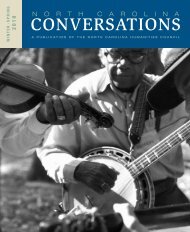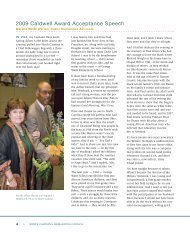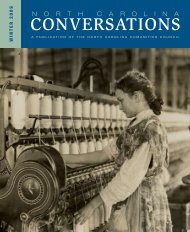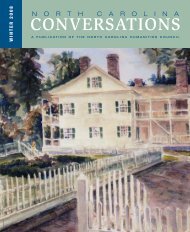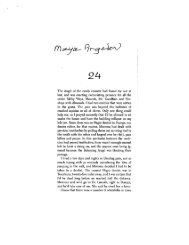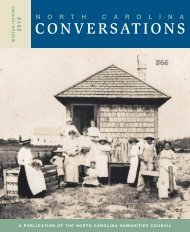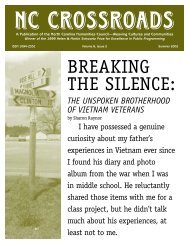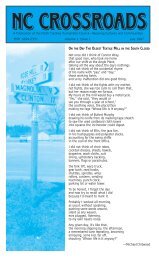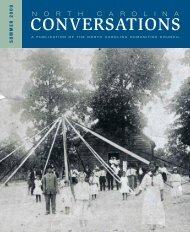North Carolina Conversations Summer-Fall 2008.pdf
North Carolina Conversations Summer-Fall 2008.pdf
North Carolina Conversations Summer-Fall 2008.pdf
- No tags were found...
Create successful ePaper yourself
Turn your PDF publications into a flip-book with our unique Google optimized e-Paper software.
The Long-Haulare being sold at prices so cheap thenative wild-caught fish are at a pricedisadvantage. And the price of dieselfuel has risen inexorably and catastrophically.In 2006, shrimpers werecomplaining, “You can’t make moneyon a dollar and a quarter [paid fora pound of] shrimp and $2.25 [fora gallon of] fuel.” In 2008, with fuelprices hovering around $5 a gallon,the complaint seemed merely quaint.Real estate speculators have roamedcoastal communities offeringoutlandish prices for waterfront propertiesthat they can resell for evenhigher prices to retirees seeking aplace by the water. As a result, manyfishing communities are in the midstof profound changes.“Ultimately, what is even more significantis the change that will occur tothe social fabric of the village,” saysCapt. Ernie Foster of Hatteras, a sisterfishing community turned resort. “Avillage is not barren rental structures,but, rather, a village consists of thepeople who live there, people whohave homes, families, jobs and businesses.They are people who belongto churches, volunteer fire departments,and civic associations. Theyare also people with roots, peoplewho are interconnected to each otherin ways both large and small.”The Western writer Wallace Stegnerdescribed a community as a placewhere people were born, lived, anddied over more than a generation.Then it was truly a community. Acommunity shapes people throughits unique culture, he said, and itsculture is created by the people wholived there. Atlantic was once sucha place and it is still such a place,but its character and that of manyother fishing villages along the <strong>North</strong><strong>Carolina</strong> coast are changing fast.What it will become is not yet evident.Crew haul in the net in the final stages of a long-hauling operation. Thefish are corralled within the loop of the net. They will be bailed into therun boat seen in the distance. Photo by Lawrence S. Earley.Down East fishermen employ many different methods to catch the widediversity of fish available. One particular process is long-haul fishing.Fisherman Jonathan Robinson describes this arduous work.Typically a haul rig is comprised of two boats. We use net skids on eachboat and three men on a boat. There are four nets on each side, and thenets from each boat are tied together and towed, usually covering anarea of about a square mile. It’s more to corral the fish — we don’t gillthem. We kind of corral the fish. The process of taking them out takesabout two-and-a-half, three hours taking the nets up. We just encirclethe fish and keep making the enclosure smaller until we get to a pointwhere we can bail the fish up on the boat. It’s an interesting process.It’s primitive — it dates back to when they first started putting poweron boats. I’m sure they had gill nets and discovered that by pullingthe ends around that they could cover more bottom and catch morefish. And then naturally, two fellows got together and tied their netstogether and worked in unison. It’s a gear that has limitations. You can’tgo out and set it randomly, you have to be in close proximity to shallowwater or shoals. Usually you can only cover about a mile and it takesfrom three to six hours to pull and then two or three hours to get thenets back. It’s restrictive, very restrictive where you can use one. Youusually go where you’ve historically landed fish under certain weatherconditions and certain times of the year and you fish those places.Technically you start from two to five a.m., depending on how far andthe time required to run to specific fishing grounds. Sometimes it’s latein the evening when you get home if you make day trips. Of course earlywhen I first started fishing, we spent a lot of time away from the island.We’d leave on the weekends, on Sunday afternoon, and most timesreturn on Friday night.NC <strong>Conversations</strong> • <strong>Summer</strong> 2008 • 9



